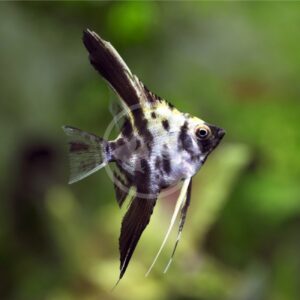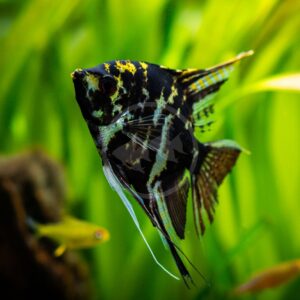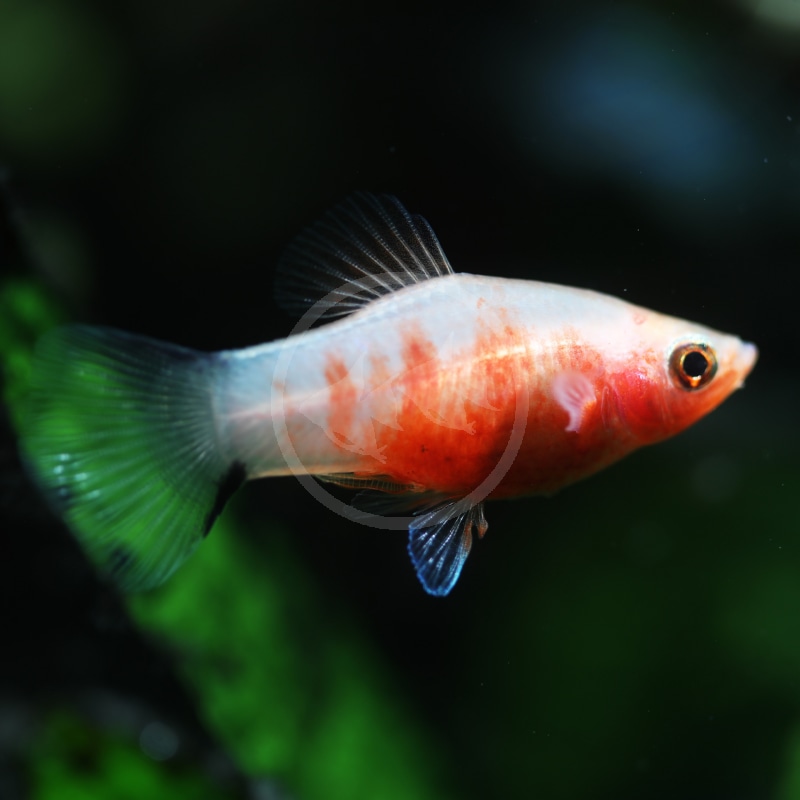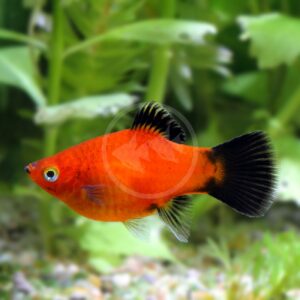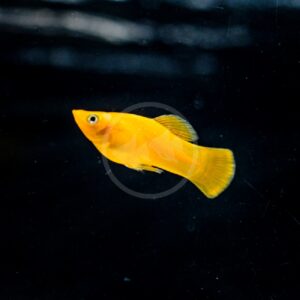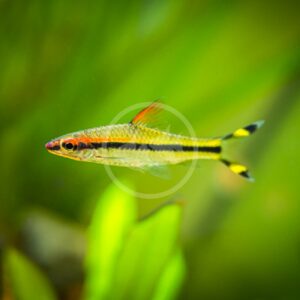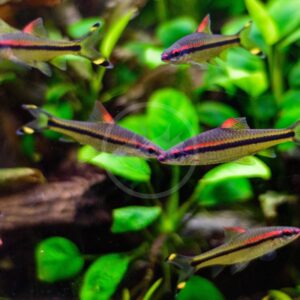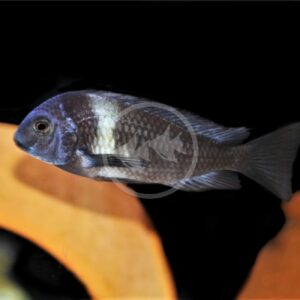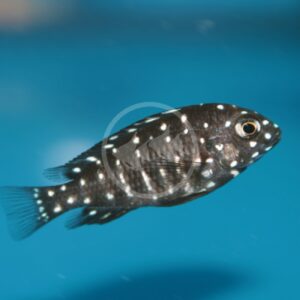PLATY – TIGER
Xiphophorus maculatus
$8.99
The Tiger Platy is a selectively bred ornamental strain from the ancestral wild-type southern Platy (Xiphophorus maculatus) that comes from rivers and streams along the Atlantic coastal plain of Mexico, Nicaragua, Guatemala and Belize. One of the most adaptable fish in the aquarium trade, platys are peaceful fish with males exhibiting a clear gonopodium, or modified point, behind their anal fin that aids in reproduction. Tiger platys have an overall lightish white-pink body with dark reddish-orange stripes and clear fins. Platys are livebearers, meaning that females will produce live fry (i.e., offspring) in abundance. It is best to keep multiple females per a single male, as male platys tend to frequently harass females. These fish are very prolific without intervention, and sperm from males can be stored in females for several months. If you want to avoid your tank filling up with platys, we advise to stick to purchasing one sex. Adult platys can reach a size of approximately 3″, with females averaging on the larger side.
Care Level: Easy
Temperament: Peaceful
Live Plant Safe: Yes
General Description: The Tiger Platy is a selectively bred ornamental strain from the ancestral wild-type southern Platy (Xiphophorus maculatus) that comes from rivers and streams along the Atlantic coastal plain of Mexico, Nicaragua, Guatemala and Belize. One of the most adaptable fish in the aquarium trade, platys are peaceful fish with males exhibiting a clear gonopodium, or modified point, behind their anal fin that aids in reproduction. Tiger platys have an overall lightish white-pink body with dark reddish-orange stripes and clear fins. Platys are livebearers, meaning that females will produce live fry (i.e., offspring) in abundance. It is best to keep multiple females per a single male, as male platys tend to frequently harass females. These fish are very prolific without intervention, and sperm from males can be stored in females for several months. If you want to avoid your tank filling up with platys, we advise to stick to purchasing one sex. Adult platys can reach a size of approximately 3″, with females averaging on the larger side.
Diet Requirements: Platys are one of the unfussiest aquarium fishes. A diet made up of various high quality vegetable based and protein based flake foods, sinking micro pellet foods and bug bites are ideal, in addition to offering frozen foods such as bloodworms, brine shrimp and daphnia. Variety is the spice of life in order to maintain color, immune function and longevity of your fish.
Care Requirements: An established minimum 10 gallon aquarium is ideal for a small group of Tiger platys, or platys in general. Size up accordingly to accomodate a larger group, or if you intend to breed platys. While Tiger platys are relatively hardy and easy to care for, they would do best introduced into a biologically mature aquarium. Certain platys can be sensitive to water parameters given the extent of selective breeding over decades, but generally speaking platys will not do well at an acidic pH level. The aquarium does not need to be aquascaped with anything in particular, but platys do appreciate live plants and floating plant material. Tiger platys can be mixed with a wide variety of community type fishes, but exercise caution with mollies and swordfishes where conflict has been observed. Different ornamental strains of platys can be mixed with no issue, but be aware that the “quality” of their offspring and subsequent generations will be decreased from mixing two, or more, very different gene pools. Serious platy breeders often stick to a single color strain to ensure that the genetic integrity of that type is maintained. Recommended water conditions, 72-82° F, KH 10-30, pH 7.0-8.5.
Purchase Size: Medium: 1”
Note: Your item may not look identical to the image provided due to variation within species. Purchase sizes are approximate.
Dry goods orders are shipped via US Postal Service or UPS to the address provided at checkout based on the selection made in your website shopping cart. Product is carefully packed to help prevent any damage during shipping. Once processed you will receive a shipment notification via email with tracking number, and delivery notification. Please allow 48 hours for processing after your order is placed.
Perishable items (i.e. live plants, refrigerated/frozen foods) are shipped via US Postal Service 2-3 day to the address provided at checkout for a $25.00 flat rate charge. Items are packed with secure packing material and heat, cold, or Cryo packs as needed to maintain safe temperatures during transit. If one or more perishable items are in the shopping cart at checkout the $25.00 perishable shipping charge will automatically appear and need to be selected. Once processed you will receive a shipment notification via email with tracking number. Please allow 48 hours for processing after your order is placed.
Livestock (i.e. fish, invertebrates, coral) are shipped via UPS Overnight to the address provided at checkout for a $55.00 flat rate charge. Livestock is packed in insulated styrofoam boxes with secure packing material and heat, cold, or Cryo packs as needed to maintain safe temperatures during transit. If one or more livestock items are in the shopping cart at checkout the $55.00 livestock shipping charge will automatically appear and need to be selected. Livestock is shipped Monday through Wednesday ONLY (no weekend delivery is available) weather permitting, and we reserve the right to delay shipping until conditions are appropriate for safe arrival. Once your order is placed we will contact you to arrange the best shipping date based on these criteria. Someone must be available to receive the livestock order on the first delivery attempt. Once processed you will receive a shipment notification via email with tracking number. Please allow 48 hours for processing after your order is placed.
For mixed dry goods/perishable & livestock orders items will be shipped via their corresponding shipping methods outlined above. Dry goods will be shipped via US Postal Service or UPS based on your selection and checkout, while livestock will ship via UPS Overnight for a $55.00 flat rate charge. You will receive separate notifications and tracking numbers for the dry goods and livestock. Please note due to different carriers and shipping methods dry goods and livestock may arrive on different days.
Related products
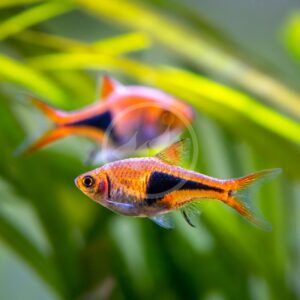
RASBORA – HET / HARLEQUIN
Trigonostigma heteromorpha
$5.99 – $8.99
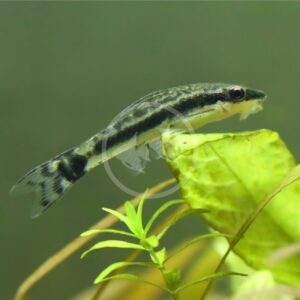
CATFISH – OTOCINCLUS
Otocinclus vittatus
$6.99
BARB – DENISONII / ROSELINE SHARK
Sahyadria denisonii
$9.99 – $79.99
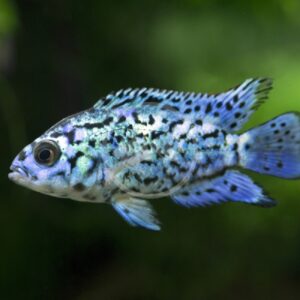
CICHLID – JACK DEMPSEY ELECTRIC BLUE
Rocio octofasciata
$19.99 – $99.99
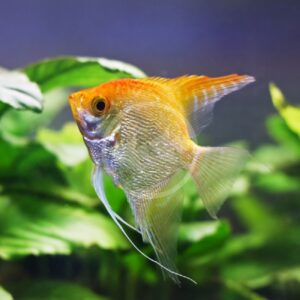
ANGELFISH – FW GOLD
Pterophyllum scalare
$9.99 – $19.99
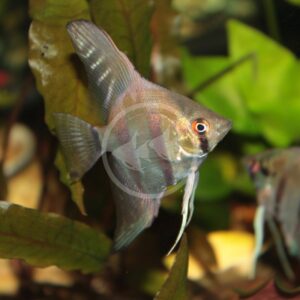
ANGELFISH – FW SILVER
Pterophyllum scalare
$9.99 – $39.99
